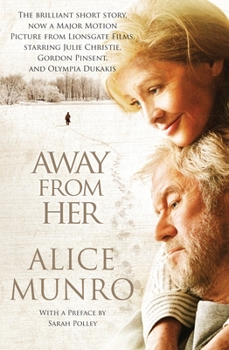Away from Her
From Nobel Prize-winning author Alice Munro, "a true master of the form" (Salman Rushdie), comes the brilliant short story that inspired the major motion picture starring Julie Christie and Gordon Pinsent--featuring a Preface from Sarah Polley
"I've always loved Alice Munro's writing, but this story punctured something. I read it, stunned, and let it sit there. It seemed to enter like a bullet. So concise and unsentimental,...
Format:Paperback
Language:English
ISBN:0307386694
ISBN13:9780307386694
Release Date:April 2007
Publisher:Knopf Doubleday Publishing Group
Length:96 Pages
Weight:0.25 lbs.
Dimensions:0.3" x 4.9" x 7.2"
Customer Reviews
2 ratings
Strong story, beautifully written
Published by Thriftbooks.com User , 17 years ago
Away From Her is actually Alice Munro's short story, The Bear Came Over The Mountain. The title change is because the story was made into a feature film. I would suspect that the attention the film brought to the story resulted in Vintage Books publishing a slim volume of 76 pages. Grant is a retired professor who, while he loves his wife, Fiona, has spent his life balancing marriage with love affairs. Fiona is 70 and begins to exhibit memory loss. As she slowly recedes into the fog of Alzheimer's, the past and present are thrust upon Grant with unrelenting confusion, guilt and sadness. When Grant is finally forced to place Fiona in the Meadowlake facility he is not prepared, after a mandatory thirty-day separation to help her settle in, to find that his wife is truly gone to him. Somehow he thought he'd have time--days, weeks, perhaps months, before she left him for good. But when he arrives at Meadowlake, Fiona has embraced life there and has made new friends. The most important friend is Aubrey. And when Aubrey leaves the facility, Fiona's health rapidly deteriorates. If Grant is to save his wife from the `second' floor of Meadowlake, he will have to be selfless and do what he thinks is best for Fiona. But will it matter? Munro's prose is sparse, concise and straightforward. But the simple and beautiful words reach out to you and grab your attention and demand to be felt. It's not just a story about Alzheimer's disease; it's a deep and rich love story. And the combination of the Alzheimer's and love will leave you breathless. This is a volume I will keep and read again and again, savoring each word and most likely receiving different messages with each read. Armchair Interviews says: A must read for everyone who has been touched by the insidiousness of Alzheimer's and for those who haven't.
A Fine Short Story
Published by Thriftbooks.com User , 17 years ago
Although a friend whose taste I respect swears by Alice Munro and at her recommendation, I have been going to read this writer for years, "Away From Her/The Bear Came Over the Mountain" is the first thing I have read by this author and after having seen the wonderful film directed by Sarah Polley and starring Julie Christie, Gordon Pinsent and Olympia Dukakis. I have the same problem with this short story that I had with Michael Cunningham's THE HOURS and with Annie Proulx's "Brokeback Mountain." I cannot separate the written word from the movies although I read both of these writers before seeing the films. They are forever merged in my brain as is the case I think when the movie is as good as the novel or short story. To further complicate matters, Ms. Polly writes a thoughtful, incisive preface to this edition of the short story so I also have her words to try to separate from the film and Ms. Munro's prose. It is difficult not to draw parallels with the Munro story and the Polley film. There are differences but Ms. Polley gets into the heart of the story. Ms. Munro, on the other hand, can draw a picture with few, unsentimental words and can tell the reader directly what the film often can say only with facial expressions and gestures: When Ms. Munro describes at some length Grant's many affairs many years ago while married to Fiona, she informs the reader that "He had never had any intention of throwing up work and marriage and taking to the country to practice carpentry or keep bees." Or "Her hair, which was light as milkweed fluff, had gone from pale blonde to white somehow without Grant's noticing exactly when, [something difficult to show in the film] and she still wore it down to her shoulders, as her mother had done. (There is an intensely sad scene when Grant visits Fiona after she has been at the nursing home for sometime and her condition is spiralling downward. He notices that she is wearing loud garish clothes that are not hers and that "they had cut away her angelic halo." He says to her, "'Why did they chop off your hair?' Fiona put her hands up to her head, to check. 'Why--I never missed it,' she said." Or Ms. Munro describes Fiona's new friend Aubrey's skin as "leathery but pale, yellowish-white like an old wrinkled-up kid glove." It is easy to see friends and loved ones in how these characters deal with the awfulness of Alzheimer's. The way Fiona attempts to recover when she has forgotten something went straight to my heart. My own mother would say to me when she could not remember something (I might name the names of all her grandchildren, for instance), "your memory is so much better than mine." And when Fiona manages to remember something, Grant has hope against hope that she will not get worse and/or she will never have to go to the second floor of the nursing home where patients with advanced dementia are housed. Finally, Marian, like many people in her situation, doesn't even have the luxury of leaving her husband in





